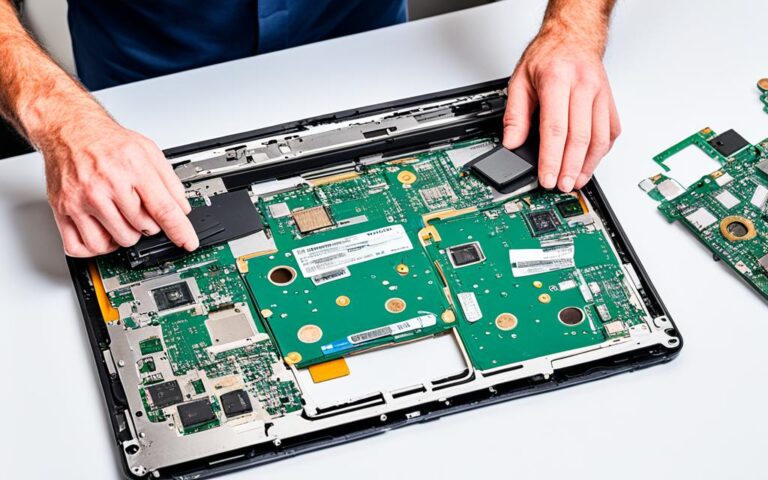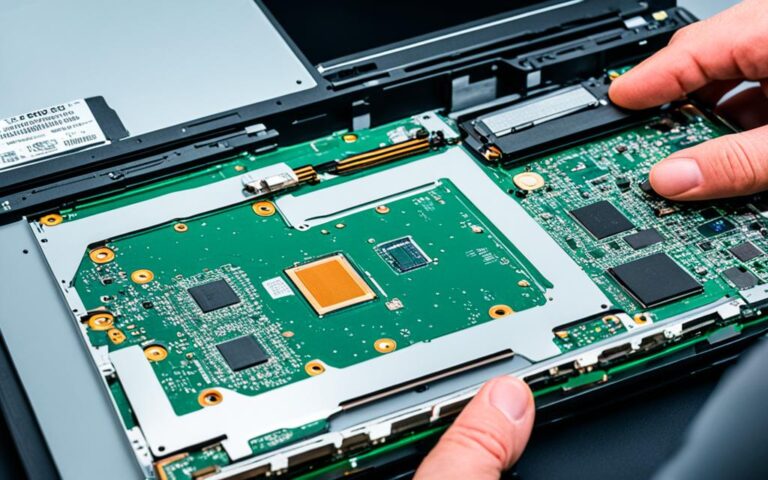The Significance of Secure Erasure in Laptop Recycling
Data erasure is the process of permanently destroying data from storage devices, such as hard drives and solid-state drives (SSDs). It ensures that the data cannot be recovered or accessed, protecting data privacy and preventing data breaches. Data erasure plays a crucial role in compliance with data privacy laws, such as GDPR and PCI DSS, by respecting individuals’ rights and fulfilling data minimisation principles. It also enables devices to be reused or resold without the risk of data leakage. Secure data erasure is a reliable method for permanently destroying data, and reputable recycling facilities offer data destruction services as part of their laptop recycling process.
Laptop recycling is an important practice in today’s digital age, where electronic waste poses significant environmental and data security challenges. When laptops reach their end of life, recycling them ensures that valuable resources are recovered and reused while preventing hazardous materials from ending up in landfills. However, recycling laptops also raises concerns about data security. Even when files are deleted from a laptop, they can often still be recovered through sophisticated methods. This is why secure erasure using professional data destruction techniques is crucial to protect sensitive information and prevent data breaches.
The Need for Data Erasure in Laptop Recycling
There are several reasons why data erasure is necessary in laptop recycling. Firstly, it protects data privacy by ensuring that personal and confidential information cannot be accessed once it is no longer needed. In today’s digital landscape, where data breaches are prevalent, safeguarding sensitive data has become more critical than ever.
By employing secure data erasure methods, recycling facilities can completely prevent data breaches. The process involves eliminating all sensitive information from storage devices, reducing the risk of unauthorized access and potential data leaks. Whether it’s financial records, personal documents, or proprietary information, data erasure ensures that no remnants can be retrieved, giving individuals and organizations peace of mind.
Lastly, before reusing or reselling laptops, it is crucial to ensure that all data has been permanently removed. Failure to do so can result in potential data leakage, compromising the privacy and security of individuals. Proper data erasure in laptop recycling mitigates the risks associated with residual data and guarantees that all devices are free from any confidential or personal information.
Overall, data erasure is an essential aspect of laptop recycling as it protects data privacy, prevents data breaches, and ensures responsible disposal of devices. By partnering with reputable recycling facilities that prioritize data erasure, individuals and organizations can confidently recycle their laptops, knowing that their sensitive information remains secure and their data privacy is protected.
The Role of Data Erasure in Compliance with Data Privacy Laws
Data erasure plays a critical role in ensuring compliance with data privacy laws, such as GDPR (General Data Protection Regulation) and PCI DSS (Payment Card Industry Data Security Standard). By securely erasing data, organizations respect individuals’ rights to control their personal information and comply with consent requirements. Data erasure also helps organizations fulfill the principle of data minimization by only retaining necessary and relevant information. Additionally, the ability to securely erase data enables organizations to fulfill data subject access requests (DSARs) and delete personal data upon request. Data erasure is an important aspect of compliance with data privacy laws.
Complying with data privacy laws is essential in today’s digital landscape. Organizations need to ensure that they handle personal information responsibly and have robust systems in place to protect sensitive data. Data erasure provides a reliable solution for safeguarding data privacy and meeting legal obligations.
The Importance of Compliance with GDPR
GDPR is a comprehensive data protection regulation that sets high standards for data privacy and security. It applies to all organizations that process the personal data of individuals in the European Union (EU) and the European Economic Area (EEA). GDPR emphasizes the rights of data subjects, empowering individuals to control their personal data and exercise their privacy rights.
One of the key requirements of GDPR is the concept of data minimization, which states that organizations should only collect and retain the minimum amount of personal data necessary for a specific purpose. By securely erasing unnecessary data, organizations can demonstrate compliance with this principle and ensure that personal information is not stored longer than required.
The Role in Fulfilling Data Subject Access Requests
Data subject access requests (DSARs) are a fundamental right under the GDPR, allowing individuals to request access to their personal data held by an organization. As part of the DSAR process, organizations may need to provide copies of personal data, rectify inaccurate information, or delete data upon request.
Data erasure plays a crucial role in fulfilling DSARs by allowing organizations to securely and permanently delete personal data from their systems. Through effective data erasure, organizations can respond to DSARs promptly and ensure compliance with individuals’ rights to access and manage their personal information.
“Data erasure is an essential practice for organizations to comply with data privacy laws and respect individuals’ rights to control their personal information.”
Overall, data erasure is an essential practice for organizations to comply with data privacy laws and respect individuals’ rights to control their personal information. By securely erasing data, organizations can demonstrate their commitment to data protection, maintain customer trust, and minimize the risk of data breaches. Implementing proper data erasure measures ensures that organizations operate ethically and responsibly in today’s data-driven world.
The Effectiveness of Data Erasure in Secure Data Destruction
Data erasure is widely recognized as a secure method for permanent data destruction. When performed using reputable and certified software or specialized hardware, data erasure ensures that sensitive information is irreversibly removed from storage devices such as hard drives and solid-state drives (SSDs). By following established data erasure standards, organizations can ensure the effectiveness and reliability of the data erasure process, safeguarding against unauthorized access and data breaches.
One notable framework for data erasure standards is provided by the Asset Disposal and Information Security Alliance (ADISA). ADISA sets stringent guidelines to ensure that the data erasure process is executed in a trustworthy manner, meeting the highest industry standards. By adhering to these guidelines, organizations can confidently demonstrate compliance with data protection laws and regulations.
Secure data erasure minimizes the risk of data leakage and unauthorized access, providing an essential layer of protection for organizations and individuals. By permanently destroying data, sensitive information is rendered inaccessible and irretrievable, ensuring data privacy and mitigating the potential for data breaches.
Maximizing Device Lifecycle and Value
In addition to its security benefits, data erasure enables devices to be reused or resold without the risk of data leakage, thereby maximizing their lifecycle and value. By securely erasing data before repurposing or selling devices, organizations can confidently offer refurbished electronics without compromising sensitive information.
“Secure data erasure allows organizations to maximize the value of their electronic assets, while protecting critical information from falling into the wrong hands.”
Whether it is a company seeking to responsibly manage its IT assets or a recycling facility handling electronic waste, incorporating data erasure into the data destruction process is essential. Secure data erasure not only ensures data privacy and compliance with regulations but also supports sustainable practices by extending the lifespan of devices and reducing electronic waste.
| Data Erasure Benefits | Key Points |
|---|---|
| Security | – Permanent data destruction – Minimizes risk of data breaches – Demonstrates compliance with data protection laws |
| Reusability | – Allows devices to be reused without data leakage – Maximizes device lifecycle and value |
| Environmentally Friendly | – Reduces electronic waste – Supports sustainable practices |
By embracing secure data erasure methods, organizations can confidently protect sensitive information and demonstrate their commitment to data protection. With the ever-increasing importance of data privacy and security, incorporating data erasure into the data destruction process is a crucial step towards ensuring responsible data management and asset disposal.
Conclusion
In conclusion, secure erasure is a critical component of the laptop recycling process that ensures data protection and compliance with data privacy laws. By employing secure erasure methods, sensitive information is permanently destroyed, greatly reducing the risk of unauthorized access and data breaches.
To safeguard data privacy and mitigate risks, it is essential to adhere to data erasure best practices and utilize reputable recycling facilities that offer data destruction services. This approach enables individuals and organizations to confidently protect their data, comply with data protection regulations, and avoid potential legal and financial consequences.
Secure erasure not only prioritizes data security but also contributes to responsible laptop disposal and environmental preservation. By trusting reputable providers such as Plexstar, who have extensive experience in end-to-end recovery, recycling, and data destruction, individuals and organizations can ensure both the secure erasure of their data and the environmentally conscious recycling of their laptops.
FAQ
What is data erasure?
Data erasure is the process of permanently destroying data from storage devices, such as hard drives and solid-state drives (SSDs), to ensure that the data cannot be recovered or accessed.
Why is data erasure necessary in laptop recycling?
Data erasure is necessary in laptop recycling to protect data privacy by ensuring that personal and confidential information cannot be accessed once it is no longer needed. It also prevents data breaches by eliminating sensitive information from storage devices, reducing the risk of unauthorized access.
How does data erasure help with compliance of data privacy laws?
Data erasure helps with compliance of data privacy laws, such as GDPR and PCI DSS, by respecting individuals’ rights to control their personal information and fulfilling data minimization principles. It also enables organizations to fulfill data subject access requests (DSARs) and delete personal data upon request.
Is data erasure a secure method for permanent data destruction?
Yes, data erasure is considered a secure method for permanent data destruction when performed using reputable and certified software or specialized hardware. By following recognized data erasure standards, organizations can ensure the effectiveness and reliability of the process.













